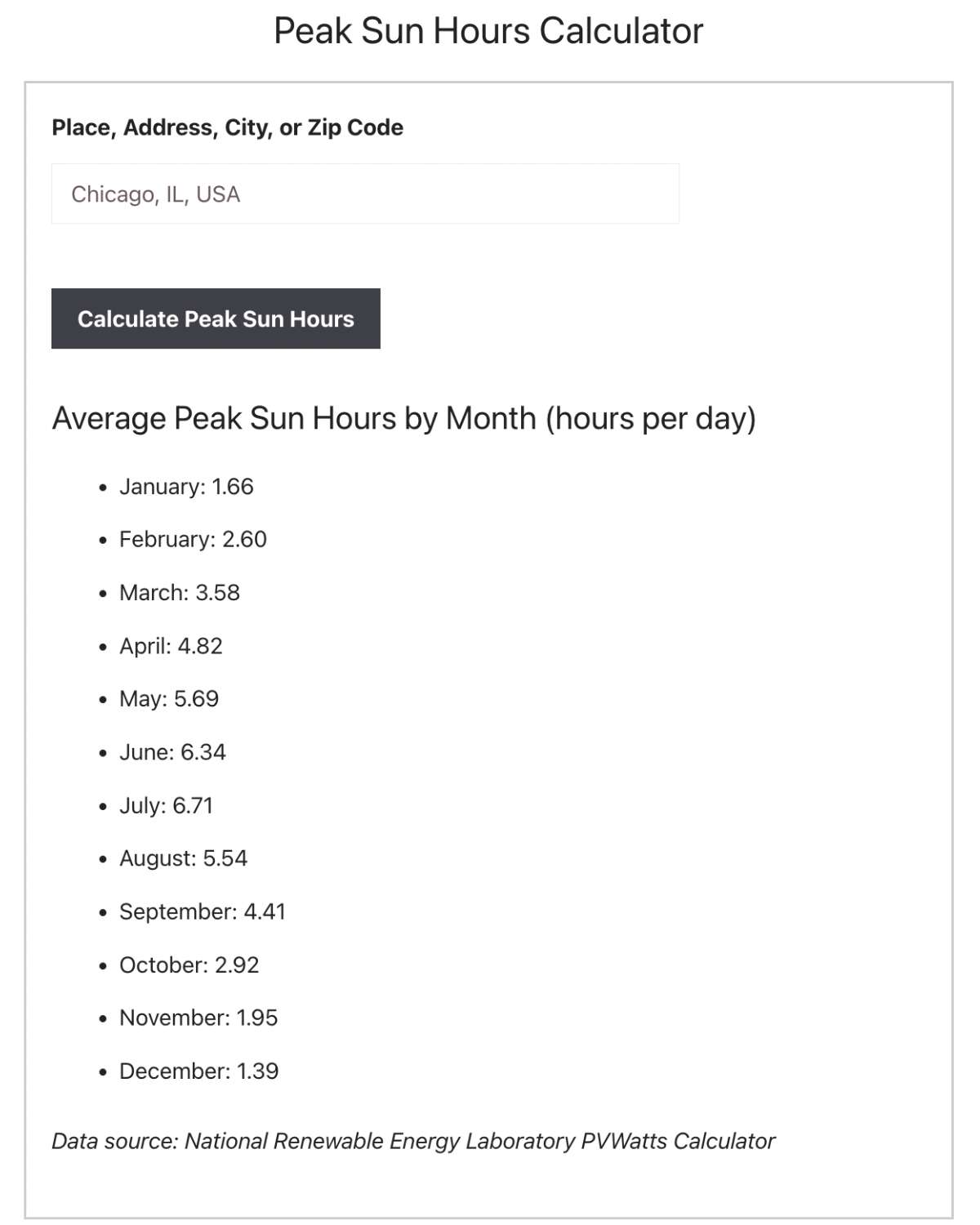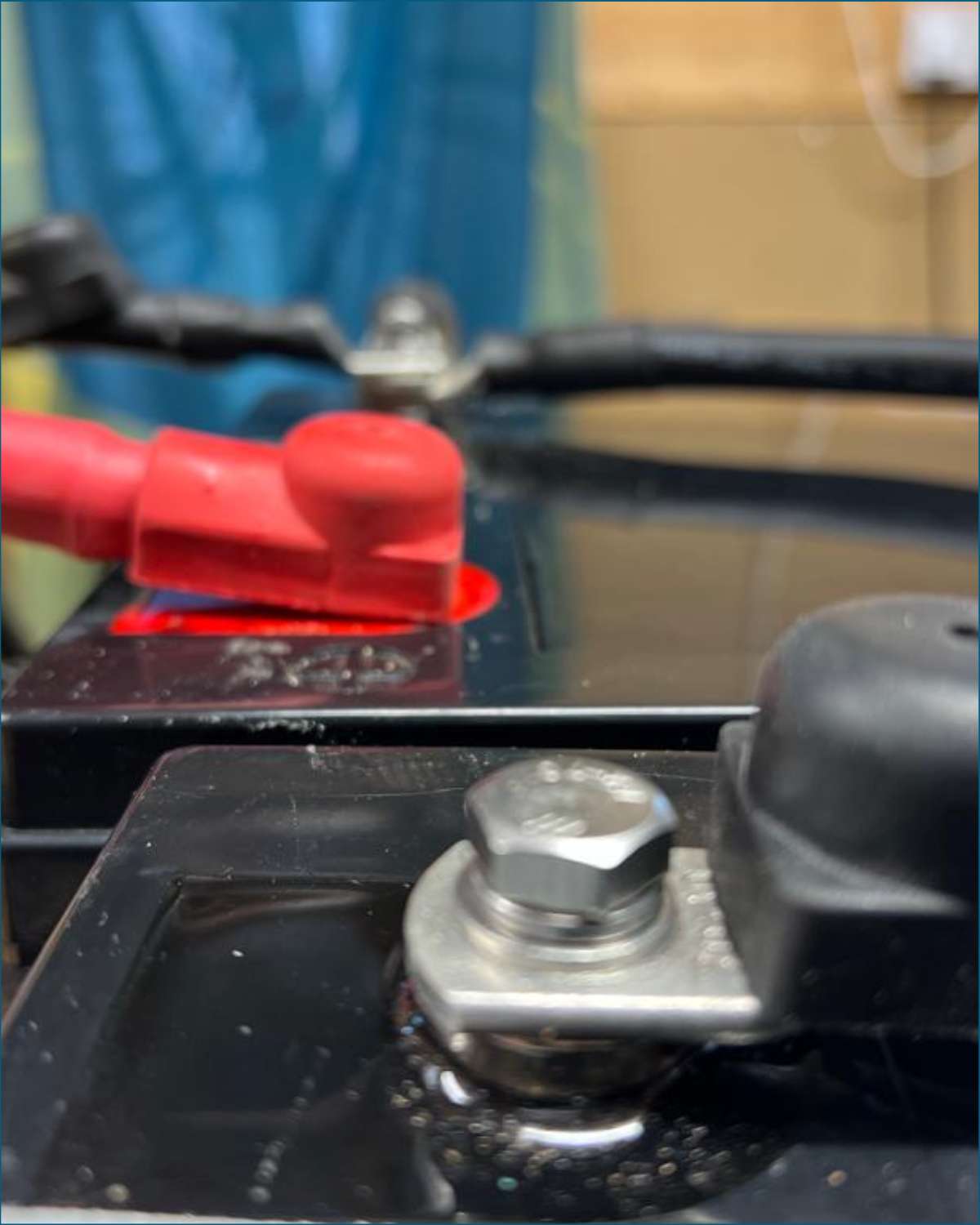Choosing components for a campervan electrical system can become confusing, especially if you’re not familiar with all the terminology.
And then you hear about parts like converters, inverters, and inverter chargers. It’s enough to boggle the brain!
It doesn’t help when it’s common practice to use these terms interchangeably or use completely different names for them.
So whether you’re a new RV owner or building a DIY campervan conversion, this post explains the basics about converters, inverters and the differences between them.
RV Camper Electrics Basics | AC and DC Power
To help explain why we need inverters and power converters in campers, we first need to understand some electrical basics.
Don’t let this put you off. It’s not rocket science, and we’ve kept it pretty simple.
There are two types of electricity – AC and DC.
AC Power – or Alternating Current
Generated in power plants and delivered over miles and miles of power lines, AC power is what businesses and household appliances typically use.
AC doesn’t flow as much as oscillate, its current changing direction constantly.
It’s this movement that creates the electricity.
This makes it more efficient to transmit over long distances, so it is ideal for supplying large amounts of energy across national networks to houses and businesses.
Most, if not all, your household appliances use AC power, so every time you plug anything into a wall socket.
However, AC power cannot be stored, so power plants manage their production 24/7, depending on how much demand is across the country.
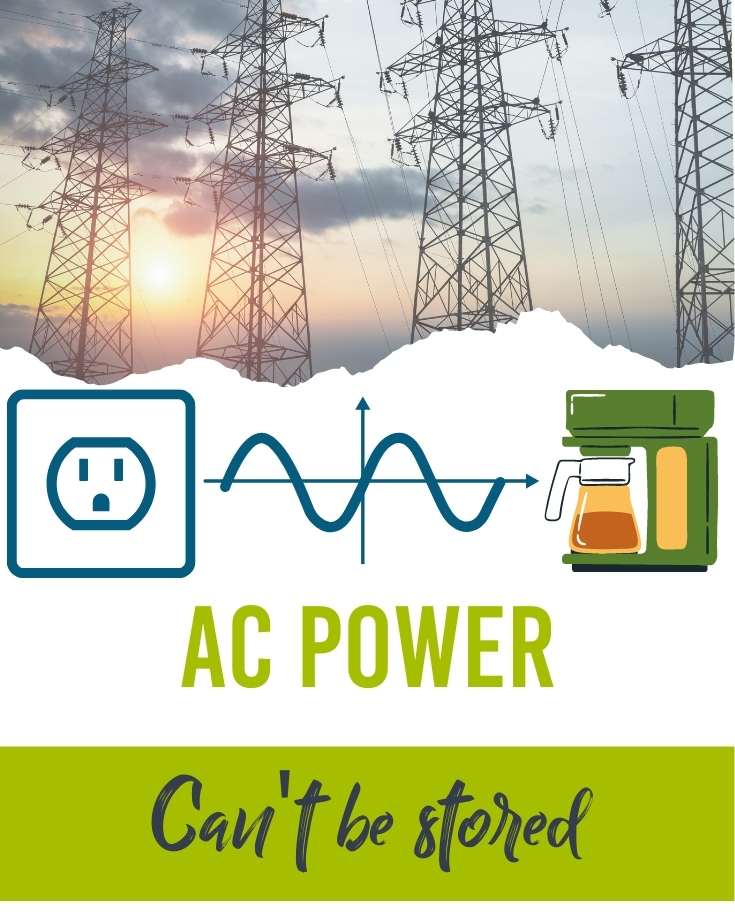
DC Power – or Direct Current
DC power continuously flows in one direction, from negative to positive.
This makes it ideal for storing in a battery and perfect for RV campers, boondocking, and off-grid living.
Batteries only hold a finite amount of power. When living off-grid, our ability to recharge them is limited, so we aim to use low voltage appliances wherever possible.
Anything with a battery, like mobile phones, use DC power. Some appliances are designed specifically to use with DC power, like 12v fridges, water pumps, and roof vents.
Appliances designed to run off AC power, like a household fridge or TV, cannot directly run off DC batteries.
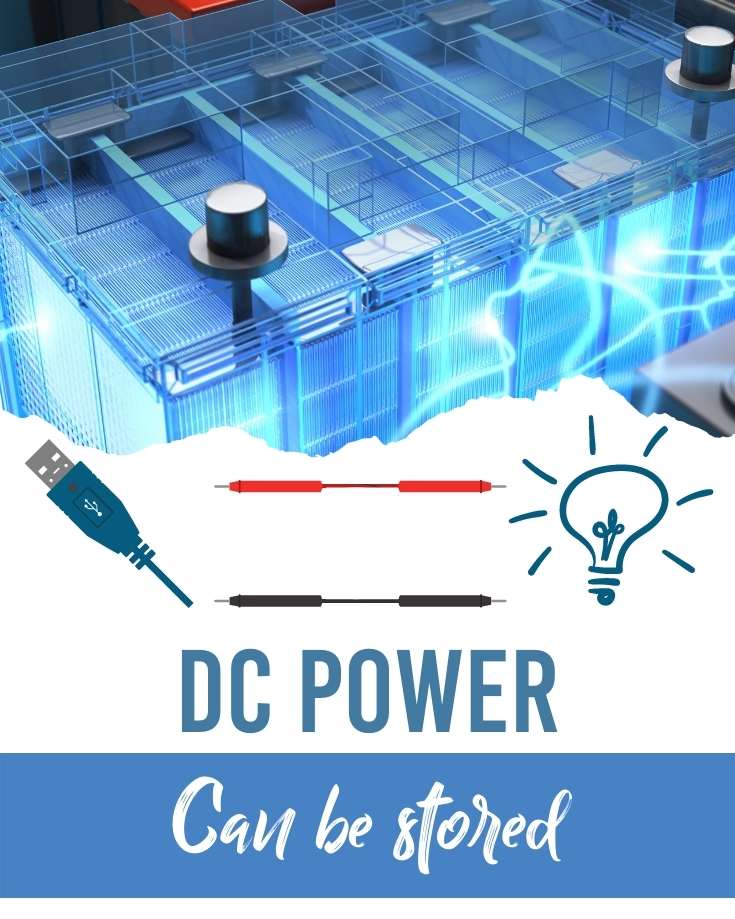
Do I need AC or DC in my RV?
When living off-grid or boondocking, all electrical needs must be met by the onboard batteries.
Batteries provide only DC power, so anything running directly from them must run on DC.
If you prefer wild camping to campgrounds, installing only DC appliances avoids the need for AC power.
If you can’t do without your AC coffee maker and TV, you’ll need AC power too.
Batteries also need to be recharged.
Even if you only use DC appliances, you’ll eventually have flat batteries without a means to replace the used energy.
Installing a camper solar system is a perfect way to stay off-grid and avoid the need for AC power.
But if you can’t rely on enough sun hours, you need AC power to recharge them.
So if you can rely on charging your batteries from solar and use only DC appliances, you don’t need AC power.
To use any AC appliance or charge batteries from the grid, you need both AC and DC power.
Why do I Need a Converter or Inverter in my Camper?
The short answer is: you don’t.
Using only DC appliances and charging batteries from solar or the alternator means avoiding these electrical components.
If you need AC power for charging batteries or powering appliances, a converter, inverter, or both is essential.
Remember, AC appliances cannot run on DC power. So how can you use the coffee maker and TV when living off-grid?
You need to change the DC power from the batteries to AC power.
A 12v DC battery can’t be charged directly by AC power either.
It’s a bit like the battery on your laptop.
The battery needs DC to charge.
You plug in the cable to the AC socket. The energy is converted from AC to DC in the power adapter before the cable connects to the laptop.
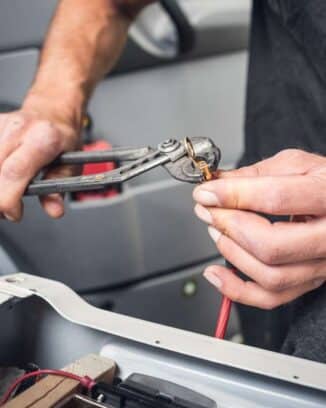
Need help & advice with your electrical setup?
Join Our Facebook Support Group
What’s the Difference Between an Inverter and Converter?
Both inverters and converters transform voltage, but they do the opposite of each other.
A converter (sometimes referred to as a battery charger, converter charger, or power converter) turns AC power to DC, transforming 110v (or 220v) to 12v. You can get them to convert to 24v too.
An inverter (sometimes called a power inverter) turns DC power to AC, transforming DC power to AC power or 12v to 110v or 220v.
To run AC appliances from the camper battery bank, you need an inverter.
To charge the batteries from shore power, you need a converter.
An inverter charger is both an inverter and a converter in one.
RV Converters
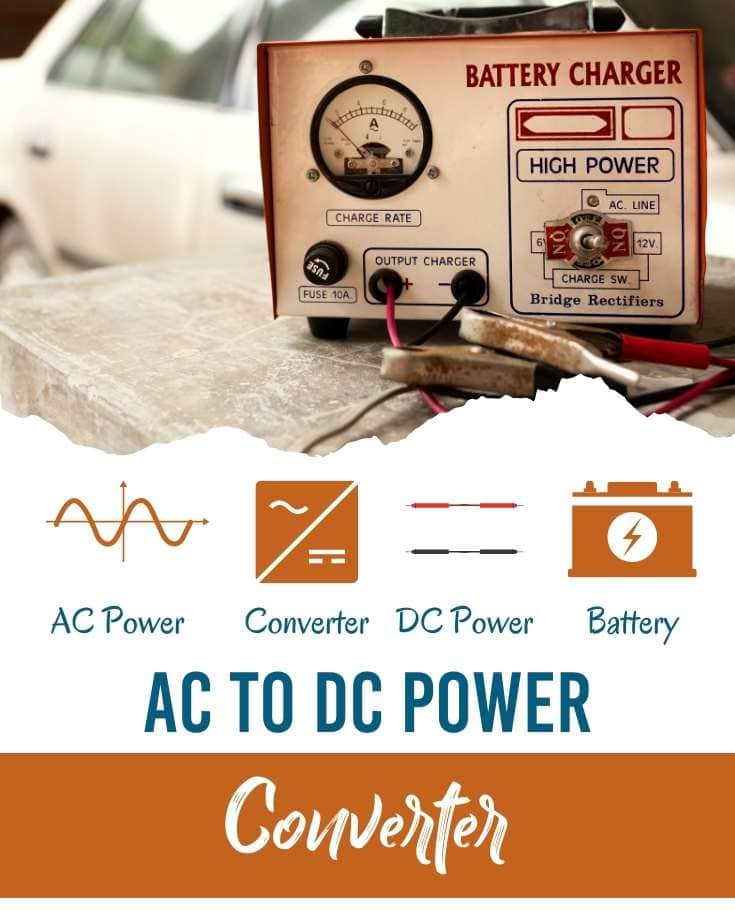
Most RVs have converters already fitted, but if you’re converting a van to a camper, this is a component to include in your electrical design.
A converter is another name for a battery charger. It takes AC power and converts it to DC to charge the 12v RV batteries.
If you spend a lot of time at campgrounds with hookup facilities, a converter is the best way to keep your batteries topped up.
They’re also useful for topping up the battery bank at home in readiness for camping weekends.
Getting enough sun hours on solar panels when living in a van in winter isn’t always easy, even with a top-end MPPT charge controller, so a converter is a fall back for recharging.
We live in our van full-time and spend 80-90% of our time boondocking.
We rely on solar to charge our batteries, but the converter comes in handy when we use campgrounds.
We’ve written a detailed post on RV converters and battery chargers, so check that out for more details.
In the meantime, here’s some tips for choosing the right one for your camper:
- Power capacity must be enough to charge the batteries in a “reasonable” time. Make sure you take into account any ongoing power usage as the battery is charging too.
- Look for easy installation units. Most converters are easy to install, but a few are a bit more tricky.
- Make sure the converter supports the right battery type – Lithium-ion, Gel, or AGM.
- For most efficient charging, choose an converter with at least 3-stage charging for AGM and Gel batteries.
- For Lithium batteries, choose a smart converter.
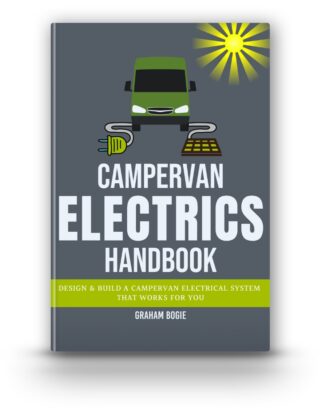
Everything you need to know about campervan electrics. Now available in ebook and paperback!
Learn how to design, size, install and troubleshoot your camper’s electrical system.
RV Power Inverters
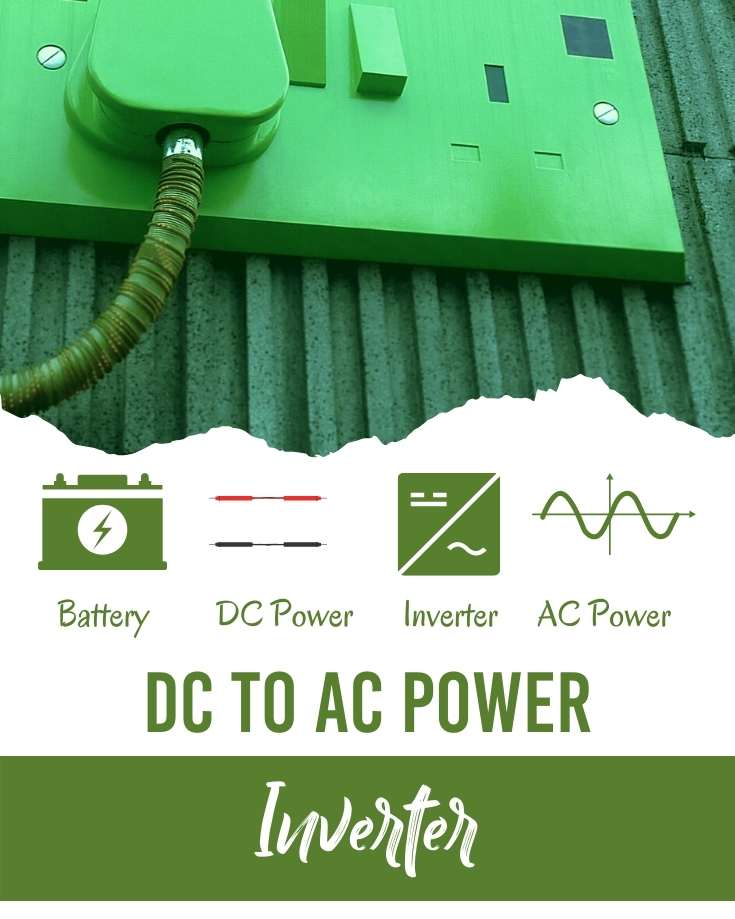
Living off-grid takes some planning to help reduce energy demand. Being frugal with the use of electricity will help keep you off-grid for longer.
We recommend using DC alternatives wherever possible. Not only will they minimise the need for AC, but they tend to be more energy-efficient too.
If you want to run household appliances like a TV, microwave, or coffee maker, you need to convert the DC battery power to AC power.
A power inverter does the job and allows you to plug in extension leads or AC devices directly.
We’ve written a detailed post on campervan power inverters so check that out for more details on how an invert converts current.
The key points to remember when choosing one for your van life:
- AC electrical devices tend to be quite thirsty, so use a lot of power, depleting your battery bank much faster than their DC alternatives.
- You can’t take out more energy than you put into the battery bank.
- Converting DC to AC isn’t efficient.
- Use our inverter calculator to ensure you get the right size component to meet your needs.
- Aim to buy the smallest inverter you can get away with.
- Buy a pure sine wave inverter instead of one with a modified sine wave – it’ll give a cleaner flow of energy, reducing the chance of damaging electronic devices.
We’ve managed for almost 3 years with a 300w inverter.
Inverter Chargers
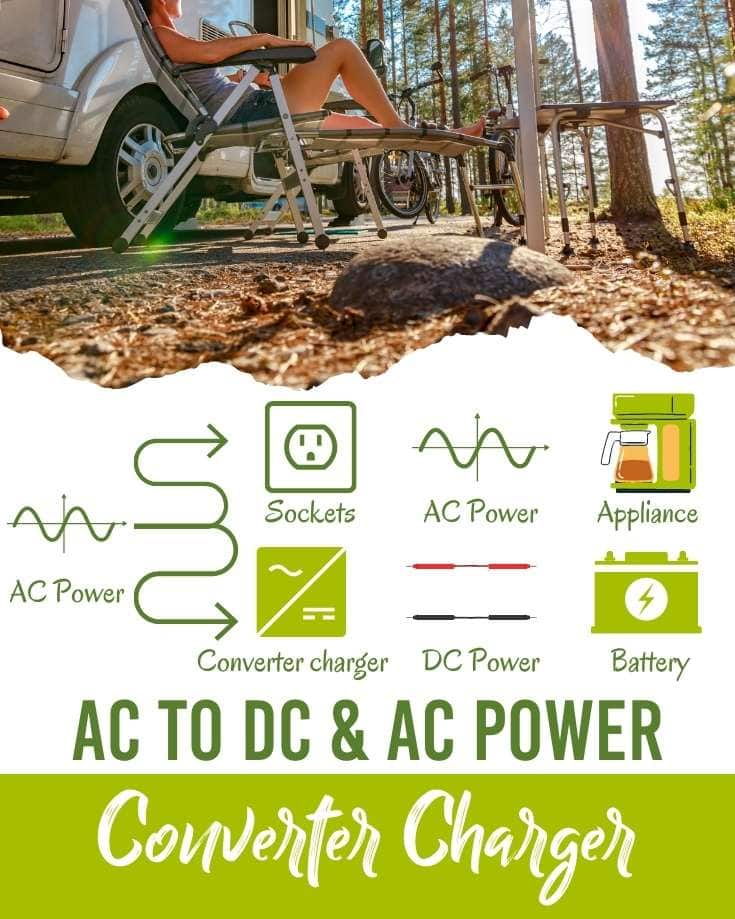
Dig deep enough into your pockets, and you could replace 2 components with a combined inverter charger.
Again, we have another post about RV power inverter chargers.
As the name implies, an inverter charger is both a power inverter and a smart battery charger.
They tend to have a few extra features like automatically start the RV generator if the batteries drop to a certain level. You don’t need to switch them on manually either.
Although much of what you may read on the internet suggests these are far superior to the separate components, this isn’t always the case.
They do have more features, but many of those are bells and whistles.
The biggest downside of them is they tend to be pretty big in terms of their power capability.
This means if you need a large converter but a small inverter, you’ll end up need to buy an oversized component.
But if you need pretty large components, they may be ideal for you. They certainly make the electrical setup more simplistic.
Automatically Create Your Bespoke RV Wiring Diagram
Includes 110v & 240v, solar, B2B, batteries, inverters, 12v, 24v & 48v systems, wire gauges in AWG & mm² & much more!
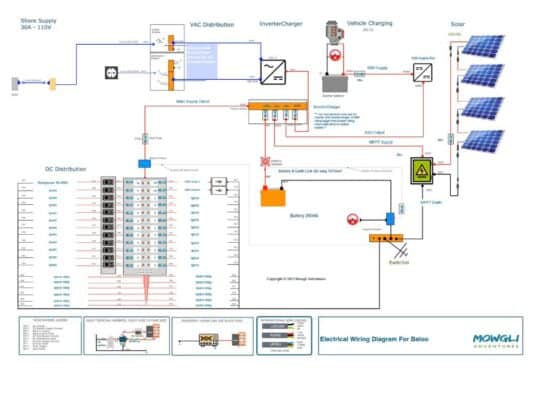
Graham Bogie

Graham is a seasoned marine electrical engineer with two decades of experience designing customized electrical systems for plant machinery and converting campers and overland vehicles. His expertise has led him to author the reputable Campervan Electrics Handbook and become the chief designer of the RV Wiring Design Tool. As a knowledgeable figure in the field, his YouTube channel, blog, Facebook group, and newsletter, offering electrical advice and product reviews, reach more than a million users each year.

